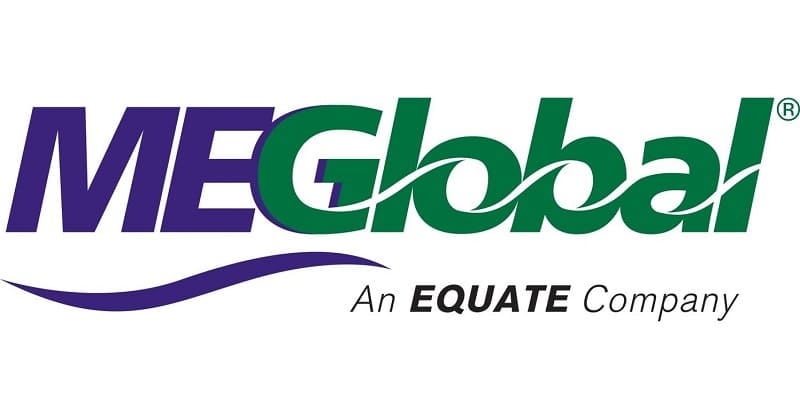Plastics-recyclability – MEG prices 19-10-2022 - Arhive
Plastics-recyclability – MEG prices
Crude Oil Prices Trend

Crude Oil Prices Trend Polyestertime
-Growing threats for the plastics converting industry: Companies at risk due to multiple crisis
Never-ending price increases, a still persistent difficult supply situation and rising ‘Force Majeure’ statements in the third quarter of 2022: The PVC industry is continuously confronted with several crisis – partly beginning to endanger existences in the plastics converting industry in Europe.
The plastics converting industry is hard hit by the multiples crisis in Europe: Compared to the beginning of the year, converters must pay up to 750 % higher prices for electricity. The never-ending price increases go hand in hand with the still difficult supply situation for raw materials. Consequences are temporary shutdowns of production plants which affects the entire PVC value chain of the plastics industry badly. Urgently planned and needed investments for example in innovative products as well as recycling technologies cannot be made due to the extreme financial burdens of companies.
In addition to these difficult circumstances, we see a major increase of ‘Force Majeure’ statements in the third quarter of 2022: Current data show a total of 58 active Force Majeures at the beginning of October 2022 – 25 of them only reported between July and September. Of all polymers, PVC (polyvinylchloride) is worst affected. Overall, the data report that FM statements have continuously increased monthly since March 2022.
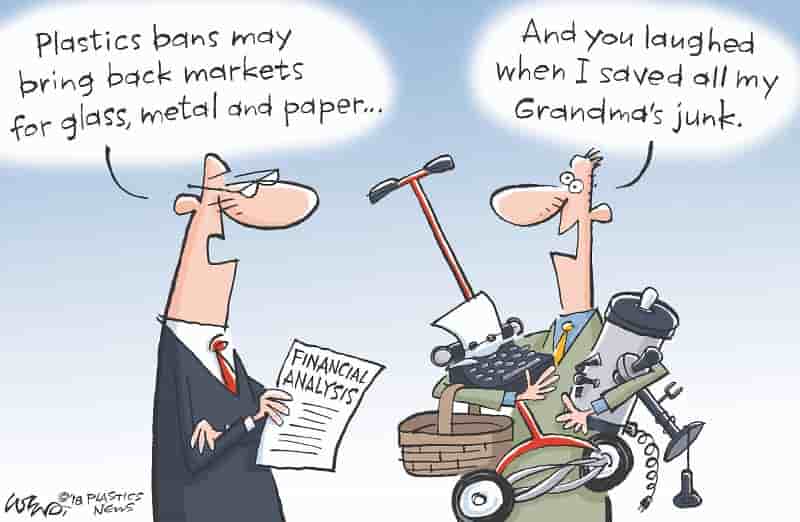
-Italy: Rising energy prices hurt country’s textile industry
Italy has been hit hard by surging inflation since the beginning of the year. Entrepreneurs and workers are concerned by the dramatic increase in energy bills. The fashion and textile industry has been particularly badly hit by this energy crisis.
-Audi pilot project aims to improve plastics recyclability and help save primary materials
Audi is promoting sustainable product development and wants to establish more and more cycles. Together with partners from science and industry, Audi is researching ways of improving material recyclability and saving primary materials. In collaboration with the Fraunhofer Institute, the manufacturer is now testing an additional method of recycling plastics and making them usable for mass production. As part of Audi Environmental Week, Audi employees will be focusing on recycling and other ideas. This is the campaign’s second year and it is intended to promote networking, exchange, and interdisciplinary cooperation with the aim of improving Audi’s sustainability performance.
Audi wants to make cycles an integral part of the automotive value chain. The company is launching pilot reprocessing projects for a growing number of materials and components. The objective is to gain experience with as many processing techniques as possible and produce derivatives for future applications of particular raw materials. Material cycles have several advantages: on the one hand, they reduce demand for renewable and raw nonrenewable materials. On the other hand, materials based on material cycles have a more favourable energy footprint. The company with the four rings is also keeping a close eye on the energy required for recycling – anything that does not make sense from an ecological point of view will not be pursued after the pilot phase. In addition, ever more efficient recycling methods are increasing the company’s sustainability as a whole.
Different recycling methods for different types of plastic
Since not all types of plastic can be sorted and recycled with the same quality or even in the same way, Audi is looking at different technologies at the same time: mechanical, chemical, and physical recycling. Audi’s vision is to qualify more and more materials for diverse and demanding applications in cars and to identify optimal processing and recycling techniques in order to be able to close cycles
“Our focus is always on getting as many plastic contents as possible out of the car at the end of its life in order to be able to recycle them again,” says Mike Herbig of Audi’s polymer team.
Today’s vehicles typically contain more than 200 kilograms (440 lbs.) of various plastics and plastic composites. Bumpers, radiator grilles, various interior parts, as well as components in the drive system and air conditioning are all made from it. This mixed plastic waste is first mechanically crushed and separated from other materials. It can then be processed again into plastic granules in a subsequent process.
Same requirements for components made from recycled materials and virgin materials
The quality demands placed on plastics are high. The same criteria apply to recycled components as to virgin materials. These include crash safety, heat resistance, and media resistance, e.g., against organic solvents, oil, or hydraulic fluids. In addition, there is dimensional stability and quality, feel, appearance, and smell throughout the vehicle’s entire service life. Environmental requirements also must increasingly be taken into account.
“We only use a recycled material if the components made from it also meet the requirements, which is to say if the quality of the parts remains the same over their entire useful life,” says Mike Herbig.
Mechanical recycling of plastics reaches its limits where different plastics are processed as a composite and various adhesives, coatings, and fillers such as glass fibres are used. An added disadvantage is that the quality of the plastics decreases with each mechanical processing step. As a rule, plastics recycled in this way are no longer suitable for use in vehicle construction, especially not for safety-related components.
Together with the Karlsruhe Institute of Technology (KIT) and industry partners, Audi has also developed a chemical recycling method. Mixed plastic waste is processed into pyrolysis oil. Pyrolysis oil can replace crude oil as a raw material in the production of high-quality plastics. The components produced in this way are just as valuable and safe as when they are made from virgin material.
Physical recycling feasibility study
In addition to research projects focusing on mechanical and chemical recycling, Audi is also conducting a feasibility study in cooperation with the Fraunhofer Institute for Process Engineering and Packaging IVV to investigate the possibilities of the physical recycling of automotive plastic waste and its reuse in vehicles. This method makes it possible to work with plastics with significantly higher levels of contamination, meaning that simple and incomplete pre-sorting from on old vehicle is sufficient.
Unlike chemical recycling, plastic is not destroyed by physical recycling. Instead, it is dissolved with solvents. This means that no chemical degradation reaction takes place and the polymer chains remain undamaged.
“Only substances that are absolutely harmless are used as solvents,” explains Dr. Martin Schlummer of Fraunhofer IVV. “Other solids that could interfere with the new end product are separated”.
Dissolved substances such as flame retardants can also be dissolved from the plastic solution if necessary. The solvents used are then evaporated and also fed into the cycle. After drying, this results in a very pure plastic granulate that matches the quality of virgin material.
The aim is now to produce larger quantities of this granulate in order to ensure its technical feasibility and to test its cost-effectiveness. In further testing, the “plastic with a past” will be transformed into add-on parts, such as the seat height adjuster. It is a small component, but it has to meet high standards in terms of emissions and odour. In the future, Audi plans to use the various recycling technologies to complement each other in order to recover plastics from old vehicles for high-quality reuse.
Further increase in the proportion of recycled materials in the vehicle
In the future, Audi wants to increase the proportion of recycled materials in vehicles further. There are already as many as 27 components made with recyclates in an Audi Q4 e-tron. The exterior includes components such as the mounting bracket, a component that has to meet particularly high demands in terms of its mechanical properties. What’s more, large proportions of the headlight mounts, wheel arch liners, fender covers, floor trim, and wheel spoilers are made from secondary raw materials.
In the interior of the Audi Q4 e-tron, recyclates are used in the insulation and damping materials. Moreover, many of the visible surfaces contain recycled materials. These include the floor covering and parts of the luggage compartment trim. In the S line interior, the upholstery for sports seats is made of Dinamica microfiber material, in combination with artificial leather. Polyester fibres make up 45 percent of the Dinamica material, which nonetheless looks and feels like suede. The fibres used are derived from recycled PET bottles, old textiles, or residual fibres.
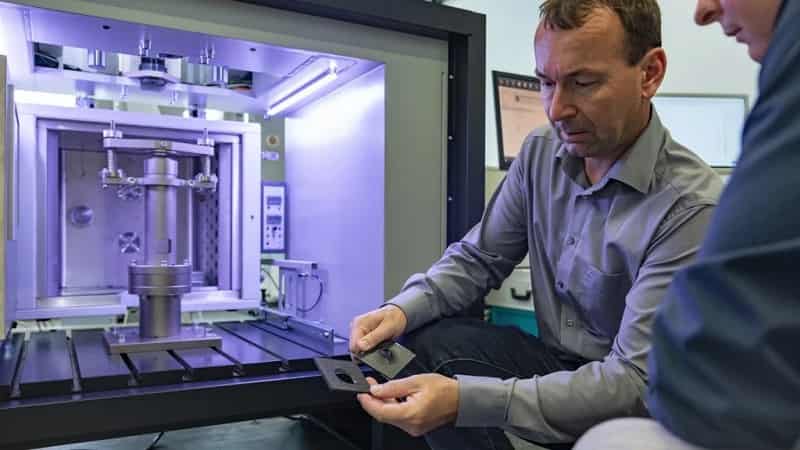
-Double-cavity melt filtration should appeal to recyclers at K
At this year’s K, recycling specialist BritAS will be presenting the ABMF PET-C melt filter to the public for the first time.
The ABMF-PET-C Automatic Belt Melt Filter is designed to produce consistently high re-granulate quality through fully automatic melt filtration using double-cavity technology, says BritAS.
“The melt filter is particularly suitable for underwater or strand pelletising. Essential for our customers is the high PET regranulate quality at low operating costs. Filtration fineness down to 20 µm and the low melt loss <1.0 % distinguish the ABMF-PET-C,” said Thomas Lehner CSO BritAS Recycling-Anlagen.
In order to filter contaminants from plastic waste, a clean screen belt is automatically inserted into the BritAS filter without stopping production each time the filter is changed. Up to three screen belts can be used at the same time, which allows different filter fineness to be precisely matched. “As a result, the quality of the re-granulate remains consistently high and the dirt is discharged from the machine with very little melt loss,” said Heiko Henss, CEO BritAS Recycling-Anlagen.
In combination, the filter mechanism and control system provide fully automatic, practical operation in double-cavity mode, which requires no intermediate storage of melt. The extruder continues to run during the screen feed, ensuring process reliability.
It is suitable for post-consumer plastic waste with a focus on PET, as well as PET-like materials and low-viscosity plastics such as PA.
“The ABMF-PET-C is the perfect solution especially for heavy contamination,” said Lehner.
“In addition to the automatic operation of the double-cavity filter with high plastic throughput, the use of screen belts with Dutch weave ensures high output. Furthermore, the optimised inner workings of the ABMF-PET-C and the revised heating system keep the operating costs of the melt filter low,” said Friedrich Kastner, chairman/managing partner at BritAS Recycling-Anlagen.
The ABMF-PET-C is available to customers with a filter area of 1,140 cm2 to 3,200 cm2 and a maximum output of 1,030 kg/h to 4,800 kg/h.
At the K booth, BritAS will also be presenting the CMF-BF continuous piston screen changer with backflush function.
The CMF-BF is able to clean the filters automatically. There are two backflush pistons in an attachment module which enable an automatic backflush process. When a filter change is required, one of the two backflush pistons is first moved into the backflush position.
This interrupts the melt flow of the corresponding filter. A small melt flow of the already cleaned material is branched off and directed backwards through the filter to be cleaned and discharged to the outside. This process is then repeated automatically for the second filter.
The CMF series consists of four filter types – discontinuous and continuous variants, covering all customer requirements. BritAS piston screen changers are designed for the recycling of plastic waste that is less contaminated.
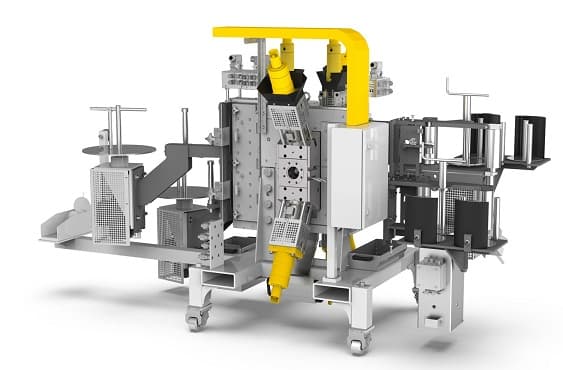
-Sumitomo Rubber claims breakthrough in ‘selective polymer development’
Previously reported tomato enzymes used as polymerisation catalyst
Sumitomo Rubber Industries Ltd (SRI) has claimed a major breakthrough in synthesising biopolymers through a selective polymerisation process.
As part of its research, SRI scientists discovered that using modified tomato enzymes as a polymerisation catalyst made it possible to select polymer initial monomers ‘at will’.
“Based on this discovery, we have now succeeded in synthesising biopolymers incorporating initial monomers that are more conducive to improving tire performance,” said Sumitomo Rubber 13 Oct.
The new biopolymers, said SRI, can help accelerate the development of what it described as “the ultimate fuel-efficient tires”.
The breakthrough is the latest in a series of bio-based rubber materials developments at SRI over the recent years.
In March, the company announced that it had successfully synthesised a biopolymer using a technology that determines the key sections affecting the length of polymer chain.
It then replaced the segment with a similar segment of a specially modified enzyme derived from tomatoes.
As part of its latest discovery, SRI said that its scientists had discovered that the use of modified tomato enzymes weakens initial monomer selectivity.
This, in turn, allows for synthesis starting from monomers other than the initial monomers typically involved in the initiation of polymerisation.
The Japanese rubber and tire group also used this newfound knowledge to synthesise “entirely new biopolymers” incorporating initial monomers that had been selected “at will.”
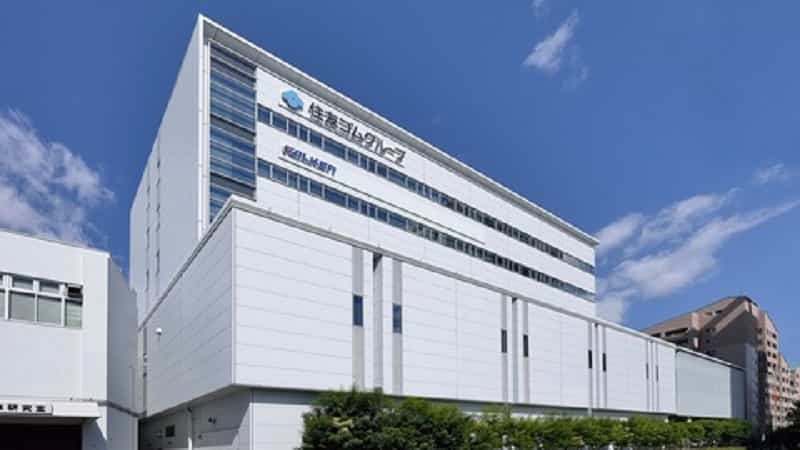
-Sorting Mixed Plastics by Color and Type
Steinert will demonstrate plastic sorting technology at K 2022.
Cologne-based Steinert will present sorting solutions for mixed plastic waste at the upcoming K Show in Dusseldorf.
The Unisort Film EVO 5.0, for 2-dimensional plastic, uses circulating air flow to stabilize films on the conveyer so that they can be detected by near-infrared sensors and sorted. The near-infrared sensors used by Steinert use hyperspectral imaging technology to detect very small differences in composition, allowing the system to distinguish PET bottles from PET trays, for example.
The Unisort Finealyse is optimized to achieve high purity in flake sorting. A high-speed belt with directed air stream stabilizes small objects, resulting in high quality sorting with minimal material loss.
The Unisort Blackeye enables the detection and separation of black and dark plastics. Using the mid-infrared range of the spectrum, black mixed plastic can be separated by resin, including PE, PP, PS, and ABS.
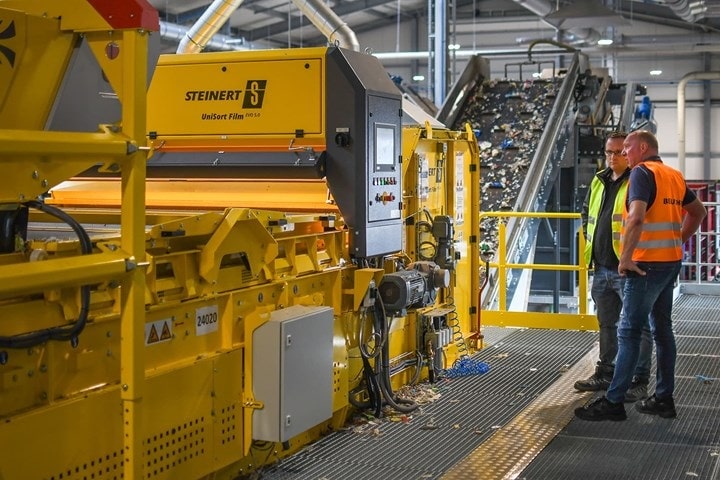
-EPE packaging product ARPLANK to make its K debut – with a recycled content pledge
ARPLANK, the sustainable expanded polyethylene packaging material from global foams specialist JSP, will debut at K Show next week in Germany.
With facilities around the world in Europe, Asia and the Americas, JSP is a specialist in the manufacture and development of expanded polypropylene (EPP) and expanded polyethylene (EPE) particle foam materials. ARPRO, JSP’s EPP foam is commonly used in the packaging, automotive and HVAC sectors, with ARPLANK, JSP’s EPE material, an ideal choice for packaging applications requiring shock absorption, vibration dampening, insulation, or chemical resistance.
ARPLANK, JSP’s innovative expanded polyethylene material, combines packaging performance with excellent environmental properties.
From 19 – 26 October, the ARPLANK team will be in Dusseldorf, Germany, for the K Show 2022, the plastics and rubber industries’ premier triennial trade show.
It will be JSP’s K Show debut in October, and the first time that its two innovative packaging materials, ARPLANK (EPE) and ARPRO (EPP), will be on display for K Show attendees.
JSP will announce three developments coming to its ARPLANK range of EPE packaging material.
From 1st January 2023, JSP says it can guarantee all ARPLANK manufactured in Europe will contain a minimum of 30% recycled content, sourced from end-of-life ARPLANK products. Considerable technical development was involved in delivering this improvement from the current level of 25% recycled content, without any compromise on material performance or function, according to the group. As with all ARPLANK grades, the material remains 100% recyclable, proving its credentials for the circular economy.
Secondly, and in response to market demand, the standard size of an ARPLANK block is increasing from 1800mm to 2000mm in length. This brings numerous benefits to the customer, including improved efficiency, lower waste, and removal of timely secondary operations such as in-house lamination. This change now makes ARPLANK the largest EPE block available on the market at 2000mm x 1200mm x 150mm and will be much welcomed by JSP’s regular customers.
The final announcement is that, for the first time, it is now possible to purchase ARPLANK directly from JSP for customers within the DACH Region (Germany, Austria and Switzerland).
What is ARPLANK?
ARPLANK is a highly resilient closed-cell bead foam packaging material, manufactured from EPE (expanded polyethylene). During the fusion process, ARPLANK’s polyethylene shells are thermally bonded to create a three-dimensional bead that has excellent properties for absorbing and dissipating energy.
The EPE beads are then moulded into isotropic blocks to create ARPLANK, a highly protective packaging material. All ARPLANK manufactured in Europe contains a minimum of 30% recycled content, is 100% recyclable, and enables material savings of up to 50% whilst maintaining the same protective properties.
For packaging applications that require shock absorption, vibration dampening, insulation or chemical resistance, ARPLANK is a natural choice. It can withstand multiple impacts without damage, is non-abrasive for class A surfaces and is incredibly lightweight.
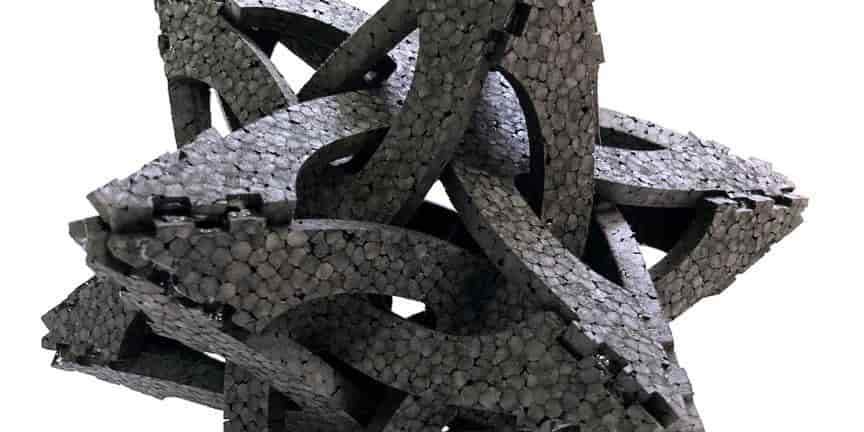
-MEGlobal decreased November MEG prices
MEGlobal has nominated its November 2022 monoethylene glycol (MEG) Asian Contract Price (ACP) at USD810/tonne, down by USD10/tonne from the October ACP, said the company.
The price is on a CFR (cost and freight) Asia basis.
Asia MEG market has been under pressure after China’s week-long National Day holiday as downstream demand has tilted slower amid the strict anti-COVID measures in China.
We remind, MEGlobal has nominated its October 2022 monoethylene glycol (MEG) Asian Contract Price (ACP) at USD820/tonne, up by USD20/tonne from the September ACP.
